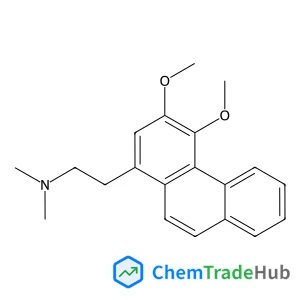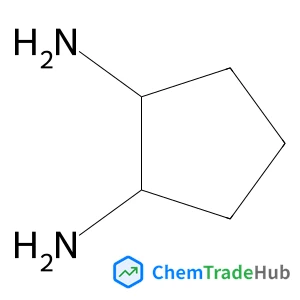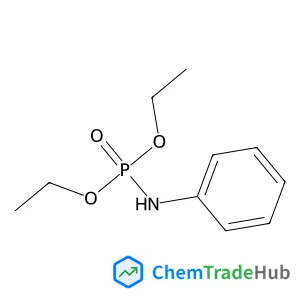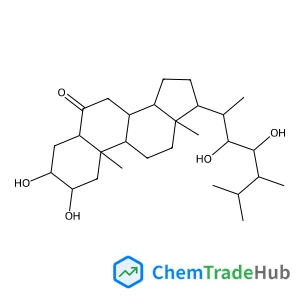Catalytic depolymerization of Kraft lignin to produce liquid fuels via Ni–Sn metal oxide catalysts
Literature Information
Baikai Zhang, Wenzhi Li, Xiaomeng Dou, Jindong Wang, Lele Jin, Ajibola T. Ogunbiyi, Xiaosen Li
In this study, Ni–Sn metal oxide catalysts, with strong Lewis acidity, were prepared and applied in lignin depolymerization to produce liquefied fuels. The Ni–Sn metal oxide catalysts could cleave the lignin linkages and stabilize the reaction intermediates due to the high Lewis acidity and the hydrogenation of nickel sites. When the molar ratio of nickel to tin was 1 : 3, a liquid product yield of 90% and a petroleum ether soluble product (mainly monomers and dimer degradation products) yield of 60% were obtained at 310 °C for 24 h. Under these reaction conditions, the petroleum ether soluble product had a higher heating value (HHV) (36.45 MJ kg−1) than Kraft lignin (25.83 MJ kg−1). A meticulous study on Ni–Sn metal oxide catalysts revealed that Lewis acidity and the synergistic effect between Ni and Sn played an important role in lignin depolymerization.
Related Literature
IF 6.367
Contents listIF 6.222
Carbon and carbon composites obtained using deep eutectic solvents and aqueous dilutions thereofIF 6.222
Solventless thermal crosslinked polymer protective layer for high stable lithium metal batteriesIF 6.367
An environmentally friendly natural polymer as a universal interfacial modifier for fullerene and non-fullerene polymer solar cellsIF 6.367
An elemental S/P photocatalyst for hydrogen evolution from water under visible to near-infrared light irradiationIF 6.222
Selective light driven reduction of CO2 to HCOOH in water using a {MoV9}n (n = 1332–3600) based soft-oxometalate (SOM)IF 6.222
Synthesis of aviation fuel from bio-derived isophoroneIF 6.367
Developing a novel high performance NaNbO3-based lead-free dielectric capacitor for energy storage applicationsIF 6.367
CaMoO4 nanosheet arrays for efficient and durable water oxidation electrocatalysis under alkaline conditionsIF 6.222
Source Journal
Recommended Compounds
Recommended Suppliers
 Anhui Tianrun Chemical Industry Co., Ltd.
Anhui Tianrun Chemical Industry Co., Ltd. Alkem de México, S.A. de C.V.
Alkem de México, S.A. de C.V. Zhejiang Weirong Pharmaceutical Chemical Co., Ltd.
Zhejiang Weirong Pharmaceutical Chemical Co., Ltd. Jiangsu Ruijia Electro-Mechanical Equipment Manufacturing Co., Ltd.
Jiangsu Ruijia Electro-Mechanical Equipment Manufacturing Co., Ltd. Weihai Zhide Vacuum Technology Co., Ltd.
Weihai Zhide Vacuum Technology Co., Ltd. ARICON Kunststoffwerk GmbH
ARICON Kunststoffwerk GmbH Addivant Germany GmbH
Addivant Germany GmbH Guangzhou Gendá Trading Co., Ltd.
Guangzhou Gendá Trading Co., Ltd. Shanghai Hutu Pump Manufacturing Co., Ltd.
Shanghai Hutu Pump Manufacturing Co., Ltd. Edelstahlservice Sulz GmbH
Edelstahlservice Sulz GmbH










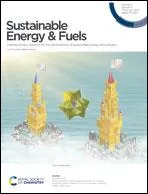
![700874-71-1 - 7-[2-(4-Morpholinyl)ethoxy]-4-[2-(2-pyridinyl)-5,6-dihydro-4H-pyrrolo[1,2-b]pyrazol-3-yl]quinoline 700874-71-1 - 7-[2-(4-Morpholinyl)ethoxy]-4-[2-(2-pyridinyl)-5,6-dihydro-4H-pyrrolo[1,2-b]pyrazol-3-yl]quinoline](/structs/700/700874-71-1-fbbc.webp)
